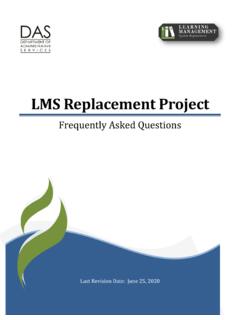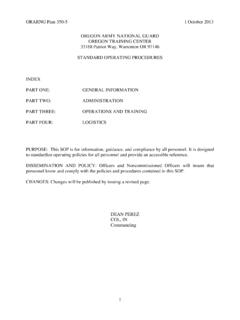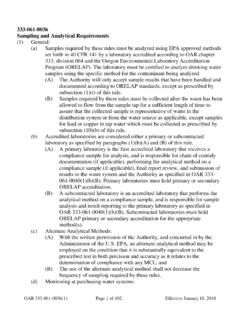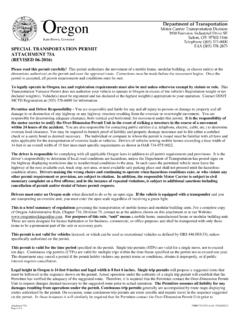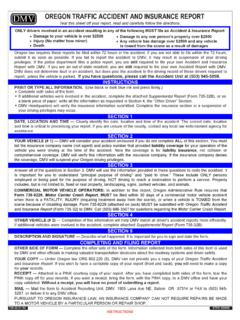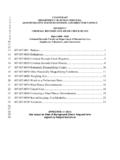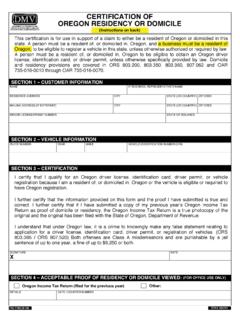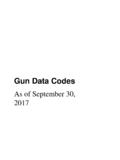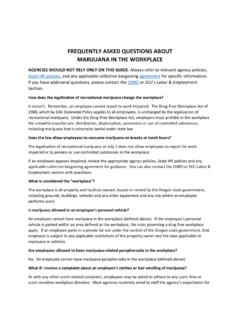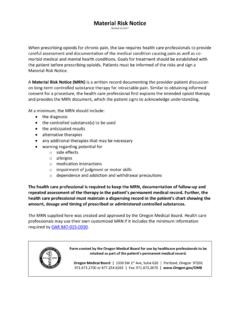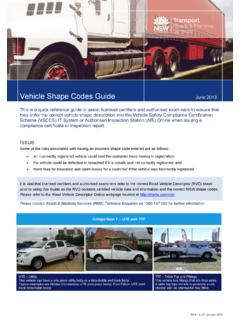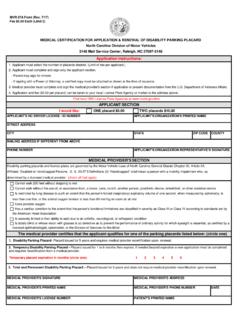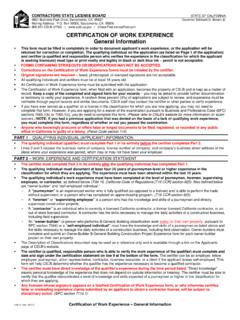Transcription of Competent Professional Authority (CPA): Requirements
1 Policy 660 Competent Professional Authority (CPA): Requirements May 2, 2018 (Revised) POLICY Each local WIC program shall have a Competent Professional Authority (CPA) on staff to determine nutrition risk eligibility and prescribe appropriate food benefits for each participant. PURPOSE To assure the quality of nutrition services in the WIC program. RELEVANT REGULATIONS 7 CFR Definition Competent Professional Authority 7 CFR (b)(2) Perform certification procedures 7 CFR (d) Determine nutritional risk 7 CFR (d)(4) Fill caseload slots 7 CFR (g)(7) Sign Certification Form 7 CFR (a)(2)(iii) Prescribe supplemental food 7 CFR (e)(5) Provide individual care plan USDA WIC Nutrition Services Standards Standard 5 (C) OREGON WIC PPM REFERENCES 215 Local Program Monitoring and Review 435 Staffing Requirements 440 Staff Training Requirements 661 Competent Professional Authority : Appropriate Counseling for Risk Levels APPENDICES Page Appendix A CPA Competency Model BACKGROUND N/A DEFINITIONS Competent Professional Authority (CPA).
2 An individual on the staff of the local WIC program authorized to assess program eligibility, determine nutritional risk, provide nutrition education and counseling and prescribe supplemental foods. Competent Professional Authority (CPA): Requirements , Continued WIC Nutritionist: A nutrition Professional working in WIC who meets one or more of the following qualifications: a Master s Degree in nutrition; a Registered Dietitian (RD) with the Academy of Nutrition and Dietetics, or eligible for RD registration; an Oregon licensed Dietitian (LD). Paraprofessional CPA: A person employed to assist or expand the efforts of Professional CPAs. A health Professional will supervise the paraprofessional s direct contact with WIC participants and their conducting of education programs. Professional CPA: A person with a bachelor s or master s degree in a health profession, such as nutrition, nursing or health education.
3 Includes physicians, physician assistants, registered nurses, dietitians, or public health educators. Competencies: Skills, actions, or behaviors related to a specific knowledge requirement that a person can be determined to possess based on a specified set of criteria. CPA Competencies: Broad, program-related statements describing tasks or skills to be mastered by a CPA; derived from performance roles and stated in behavioral terms so they can be observed and mastery can be determined. Training Supervisor: A person designated by the local program to ensure training of local staff is completed in accordance with state policy. Minimum qualifications: must be a health Professional as defined in of this policy. PROCEDURE Only staff designated and trained as a Competent Professional Authority (CPA) may determine nutrition risk eligibility and prescribe or assign food packages. Clerical staff, or any staff not trained as a CPA, may not prescribe/assign food packages for participants.
4 All food packages must be approved/assigned by a CPA. Staff who determine nutrition risk eligibility and/or assign food packages must meet the CPA Requirements described in this policy, regardless of whether they are paid for with WIC funds or not. Qualifications: Professional CPA Health professionals in any of the following categories may be authorized to serve as a Professional CPA: Registered dietitian/nutritionist or Oregon licensed dietitian Bachelor s or master s degree in nutritional sciences Bachelor s or master s degree in home economics with emphasis on nutrition Bachelor s or master s degree in health education International Board-Certified Lactation Consultant (IBCLC) Physicians Registered nurses Physician s assistants Competent Professional Authority (CPA): Requirements , Continued Qualifications: Paraprofessional CPA Individuals may be authorized to serve as paraprofessional CPAs by meeting all of the following Requirements : Has a high school diploma or GED equivalent.
5 It is recommended that local programs select individuals with appropriate educational background to meet the functional Requirements , for example, language needs. Has received training in specified competency areas by completing WIC training modules or online courses identified in 440 Staff Training Requirements . Initial training should prepare paraprofessionals for duties of the position by teaching them the basic skills needed to function as a CPA. Competencies attained during the initial training should be further developed through on-the-job training. Required Quarterly In-services Completes quarterly in-services on topics related to the CPA competencies (see 440 Staff Training Requirements ). Is observed performing certifications at least annually and has periodic evaluations to assess performance. Works under the direct supervision of a health Professional who is also responsible for ongoing job training and evaluation.
6 Paraprofessional CPAs need to consult with the WIC nutritionist on more complex nutrition issues. Has training in referring appropriately to the WIC nutritionist. All paraprofessionals will receive training in the identification of high-risk participants and in how and when to refer high-risk participants. (See 661 Competent Professional Authority : Appropriate Counseling for Risk Levels) Clear referral guidance will be provided to all paraprofessionals. Responsibilities Responsibilities of the CPA include: Perform the certification procedures, including required documentation in the data system; Determine nutritional risk; Prescribe food packages; Provide appropriate nutrition-focused counseling and breastfeeding promotion and support; Refer to health care and community services; Competent Professional Authority (CPA): Requirements , Continued Refer high-risk participants to a WIC nutritionist for follow-up and individual care plans based on the need for such plan (see 661- Competent Professional Authority : Appropriate Counseling for Risk Levels).
7 CPA Competencies A complete list of CPA competencies are described in the CPA competency model (see Appendix A). The CPA competency model illustrates the complexity of the tasks expected of a CPA and can be used to guide staff development and training over time. It is not expected that CPAs will meet all the competencies identified in the model after completing the WIC training modules or online courses. The CPA competency model reinforces the need for ongoing support, training and continuing education for CPAs. Minimum CPA competencies are met by completing the WIC training modules or online courses identified in 440 Staff Training Requirements . Local programs may choose to encourage staff to develop additional competencies to improve the quality of the services they provide to participants. Staff development and quarterly in-services may address any of the competencies listed in the CPA competency model.
8 Required Training for CPAs All persons designated as CPAs must demonstrate proficiency in the identified minimum CPA competencies by: Completing the appropriate WIC training modules or online courses. See 440 Staff Training Requirements for specific training completion guidelines. The following Oregon WIC training modules must be completed before an individual can begin certifying WIC participants of a particular category: Introduction to WIC module Dietary Risk module Appropriate sections of the Nutrition Risk module The module or online course specific to the participant category to be certified All training modules or online courses must be completed within six months of the time the individual begins certifying WIC participants. Best practice would be for CPAs working full time to complete all the required training modules and online courses within 2 to 3 months of hire.
9 Ongoing Competency Development Once an individual has completed the appropriate WIC training modules or online courses, the local program training supervisor shall document continued competency development by observation, chart reviews, etc. At a minimum, this must be done yearly and can be a component of biennial program self-evaluation (see 215 Local Program Monitoring and Review). Competent Professional Authority (CPA): Requirements , Continued WIC staff serving in the roles of WIC registered dietitian/nutritionist or training supervisor must complete the training to be a CPA. Documentation The local program must maintain a current list of staff members authorized to act as CPAs by completing the Staff Training screen in TWIST for each CPA. The local program must document that staff authorized to act as CPAs are appropriately trained and supervised. Module or course completion forms must be kept on file at the local program.
10 If you need this in large print or an alternate format, please call 971-673-0040. This institution is an equal opportunity provider. Competent Professional Authority (CPA): Requirements , Continued APPENDIX A Competency Model for Oregon WIC Certifiers Competent Professional Authority (CPA) In this document, competencies are identified for WIC personnel identified as a CPA by their agency (see Policy 660) who complete certification tasks and procedures. The 11 core areas for WIC certifiers include: 1. Program Integrity; 2. WIC Program overview; 3. Principles of life-cycle nutrition; 4. Nutrition assessment process; 5. Anthropometric and hematologic data collection techniques; 6. Communication; 7. Multicultural awareness; 8. Critical thinking; 9. Technology Literacy; 10. Nutrition Education; and, 11. Community Resources and Referrals Each competency area is presented in a separate table.
